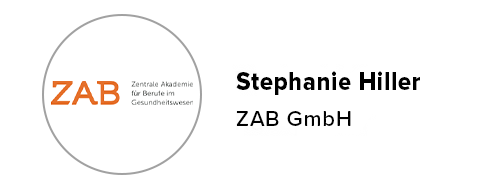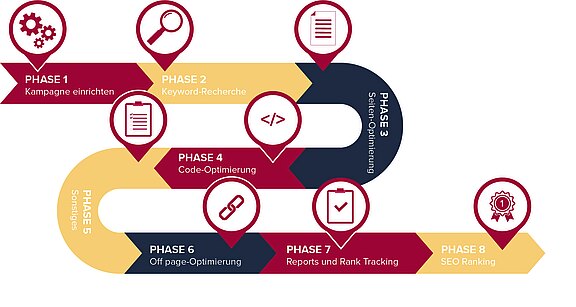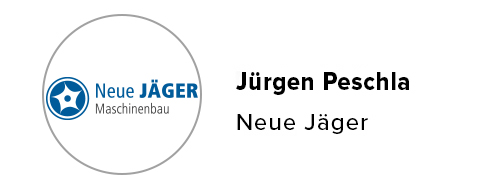How to increase the visibility of your website for Google & Co.
Increase the visibility of your website
Basically, advertising via search engines such as Google & Co. is divided into two different types. On the one hand, there is search engine optimisation (SEO) and on the other, search engine advertising (SEA).
We explain in detail here how SEO and SEA work and how you can get the maximum benefit from them. If you still have questions, please feel free to contact us via the sticky buttons or our enquiry form.
A note on our own behalf: Due to the complexity of the work, we can only offer sustainable SEO support for TYPO3 websites on our gerberCom.SERVERN.
Search Engine Optimisation (SEO) is about making many small changes to parts of your website.
Individually, these changes can be considered incremental improvements, but when combined with other optimisations, they can significantly improve the user experience and performance of your website in organic search results.
The business is done on the first page.
Paid search results fall into the realm of search engine advertising. Simply put, this type of online marketing works as follows: A company - the advertiser - specifies certain search terms (or keywords) on which its ads are to be placed.
Whenever someone clicks on one of these ads, the advertiser has to pay a small amount to Google.
These ads are always in the top positions. They are in first place if the quality factor of the ad is guaranteed (price, keywords, website).
Before we start with the SEO work, we first want to properly understand your company and your goals in a detailed, personal conversation.
In doing so, we define your core keywords together, set a budget and define the time frame of the work.
Then we add your website to our SEO software and set everything up according to your goals.
Before we can start working on the texts, the most important keywords must be entered into the system.
The starting point is the keywords you have defined. From these, we use our software to find further, relevant keywords that you may not yet have had in mind.
The better the basis, the better the SEO result. That's why we take the time to find the right keywords for your company to cover all your service areas.
The preliminary work is done - now it's time for the actual optimisation. In this phase, our specialised content writers work the previously determined keywords into your website texts and, if necessary, restructure the structure of the individual pages.
Factors such as the quantity of filler words, the length and quality of the text and the quantity of keywords play an important role. The main rule here is: more is not always better.
Once the pages are rewritten and freshly structured, it's time to optimise the system in the background. In the process, our programmers devote themselves to the HTML and Cascading Style Sheets (CSS) codes and check the server and website structure to improve the website's performance.
Since Google & Co. evaluate factors such as the page's loading speed, the correctness of codes or the structure of the page, code optimisation is of immense importance.
After the first round of optimisations has been carried out, we receive the new evaluation of our system. This evaluates the adjustments we have made, sometimes positively, sometimes negatively, and tells us where we need to go again to do more fine-tuning.
So once we have reached phase five, we still often have to jump back to phase three or four to implement the latest results again and to find more solutions. This goes back and forth until the system no longer shows us any errors.
Offpage optimisation refers to everything that happens away from the website. These are, for example, links from other websites that refer to yours, your social media channels or your Google MyBusiness profile.
When it comes to links, quality clearly takes precedence over quantity. As a general rule, it is better to have fewer good quality links than many useless ones. Good links are, for example, those from established partner sites.
During all these adjustments, not only do we get the system evaluations, but we also keep you up to date with regular SEO reports. For example, you can see how the visibility of your website is developing and observe how your keywords are climbing week by week.
This way you always know where we are and how your SEO project is developing - this is our way of showing transparency.
On the one hand, there is the technical and content-based onpage optimisation - here, structures are checked, HTML codes adapted and texts rewritten. Then there is the offpage optimisation, where links are set and social media channels are looked after.
In terms of work, the comments of an SEO software are incorporated step by step. These adjustments are constantly re-evaluated. This means that with texts, for example, new keywords have to be inserted again and again, or that different structures have to be tested to see what the customers like most.
This work is in relation to a regular evaluation of the website's visitor behaviour.
To do this, you should first ask yourself a few questions:
- What is my most important service?
- What would I Google to find a business of my type?
- What do my customers like?
- What is my most popular service/product?
- What would I like to sell more of?
When answering, you should pay attention to the most important keywords. Because these are your keywords!
With AdWords and Google Analytics, Google offers powerful tools that simplify the evaluation of the SEA campaign. This makes it possible, for example, to analyse which keywords perform best and then adjust the campaign accordingly.
The easiest way to find out if your SEA campaign is working is to see if you achieve increased customer enquiries and if your phone rings more. Because that's what counts in the end. :-)
Paid search results are marked as ads and displayed in the first results, even before the organic SEO rankings. The placement within these paid results depends, among other things, on the price one pays to Google.
Within a search, one can bid for a cheaper or more expensive place. The more you bid, the higher the ranking.
Yes. When creating an AdWords campaign, you can precisely define your target group. If desired, you can also set your ad to be displayed exclusively to your target group.
However, it is always advisable to think outside the box and try to reach other potential customers by advertising outside your target group.
Some keywords are more popular than others. With a popular keyword, you automatically have more competition bidding on the search term. The more competition, the more bids are made and the higher the price per keyword.
For example, users are more likely to search for a word like "marketing" instead of "advertising media". Therefore, the bidding competition and price would be significantly higher for the marketing keyword.

We have been working with the gerberCom.team for almost two years now. The ZAB got a new website. After only a short time, we shot straight to the top in Google visibility. The team also handles smaller service jobs in an uncomplicated, fast and extremely competent manner. Our contact persons are always available with help and advice. We look forward to further cooperation!




